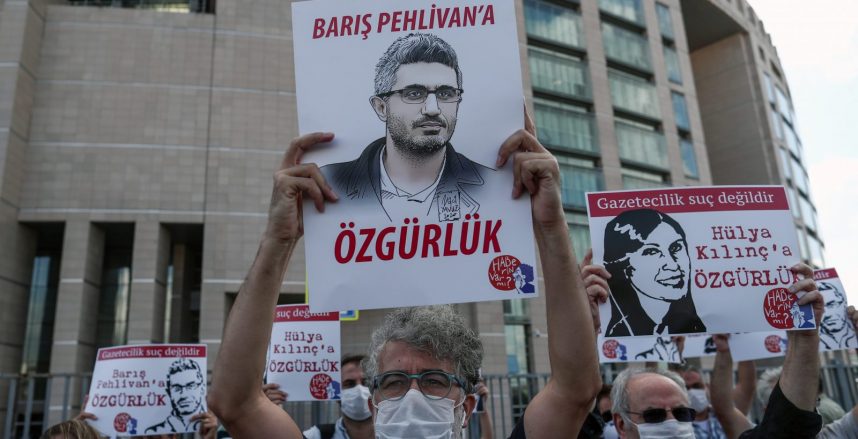
International rights watchdogs and media organisations condemned the imprisonment of well-known Turkish investigative journalist Baris Pehlivan for a fifth time, calling it a violation of freedom of expression.
Nineteen international and Turkish rights watchdogs and media organisations on Wednesday condemned the Turkish authorities’ decision to imprison investigative journalist Baris Pehlivan for a fifth time.
“We are concerned by the repeated judicial harassment of Pehlivan, who is exercising his fundamental right to free speech as a journalist in Turkey,” the organisations said in a joint letter.
On August 2, Pehlivan was informed via an SMS from the Ministry of Justice that he was expected to turn himself over to the Marmara Low Security Correctional Institution between August 1 and 15.
“Pehlivan has already been incarcerated four times due to his journalism, two of those being one day behind bars in February and May 2023 for the same sentence. This order would mark his fifth time behind bars,” the rights and media groups’ letter said said.
Pehlivan was arrested in March 2020 over his coverage of the funeral of a Turkish National Intelligence Organization, MIT officer in Libya, and taken to court alongside journalists Aydin Keser, Baris Terkoglu, Eren Ekinci, Hulya Kilinc, Ferhat Celik and Murat Agırel.
He was sentenced to three years and nine months in prison on charges of exposing classified intelligence documents.
In May 2020, the Turkish authorities postponed the sentences of thousands of inmates due to COVID-19 pandemic, but a last-minute clause excluded primarily the charges that journalists face, keeping all journalists, including Pehlivan, in prison.
After spending six months behind bars, Pehlivan was released on parole in September 2020 on condition that he does not reoffend.
After his release, Pehlivan commented on the court’s decision by saying: “There is no crime in this case. This case aims to punish our journalism.”
In July this year, the Turkish parliament enacted a measure drafted by the governing coalition regulating parole and probation rules which should have assured Pehlivan’s parole.
Instead he was recalled to prison by SMS last week for the March 2020 offence.
When Pehlivan’s lawyer filed a request for information on the decision that the journalist should hand himself in to the correctional institution, “the response indicated that the prison administration had disregarded the relevant clauses of the legislation [on parole] from July 2023”.
“We call upon the Turkish authorities to reverse the decision to reimprison Pehlivan and end the systematic judicial harassment against him and other journalists. We reiterate our solidarity with the imprisoned journalists. Journalism is not a crime and every minute a journalist spends behind bars is a violation of freedom of expression and media freedom,” the joint letter said.
Media organisations and rights groups say that Turkey under President Recep Tayyip Erdogan has become one of the world’s worst jailers of journalists, also exerting pressure on the media through court cases, fines and prison sentences.
A recent report published in June by Germany’s Friedrich Naumann Foundation for Freedom says Turkey is copying the Russian ‘playbook’, using the judiciary to silence critical journalism.
Turkey ranked 165th out of 180 countries in 2023 in the latest press freedom index issued by the watchdog organisation Reporters Without Borders.